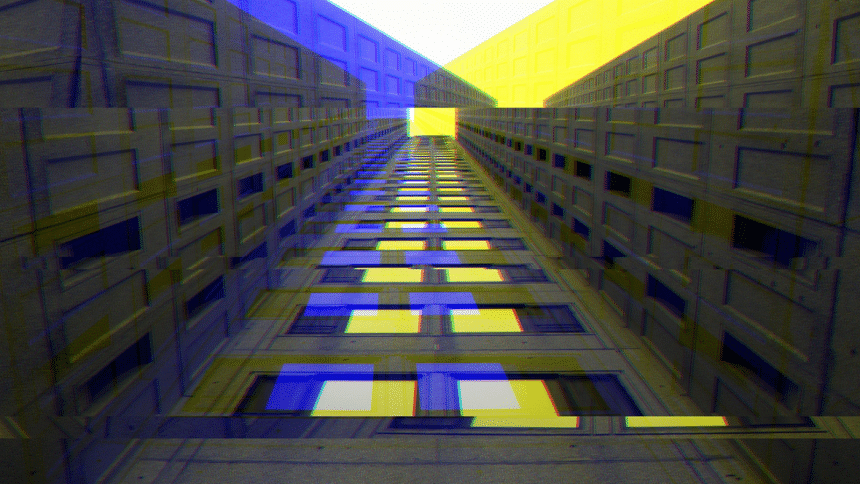The importance of being imperfect

Stillness hangs in the air, manufactured and complete. Then it comes—the synchronised azzan, a digital decree broadcast from unseen speakers across Sonali Prantor, a gated community funded by the government for senior administrators. It reverberates through Rahim's chest like a low-frequency hum, too commanding to be sacred.
He stands at the window, gazing at the pale sky, its glow filtered and artificial under the city's light-pollution shields. The dawn outside looks more like a simulation than a morning. He inhales deeply. The recycled air carries that familiar metallic tang, faint yet always present.
"Another day," he says aloud, though no one hears him. The walls, perfectly soundproofed, absorb his voice. "Another brick in the edifice of stability."
At his minimalist desk, his fingers trace the smooth surface—uniform, unblemished. A government-issued datapad lights up with precision. Today's schedule reads: Design Review–Housing Block 7B. Ensure adherence to National Aesthetic Standard–Form 3.
No deviation. No curve. No joy.
His mind slips—just for a second—to the rickshaw rides of his youth in Old Dhaka: the clanging bells, the scent of jasmine fighting through diesel fumes, the vibrant noise of human life, spilling and spontaneous.
Now, an automated metro-rail glides silently through the city. Conversations have become clipped, calculated. Efficiency replaces spontaneity.
They call it peace. Rahim calls it absence.
Inside The Walls of Conformity, the architectural firm where he works, the air is clean, temperature-regulated. The only sounds: the low hum of ventilation and the quiet tapping of compliant keystrokes. Sunlight filters through anti-glare windows, leaving pale, sterile shadows on the floors.
Farzana leans over his shoulder. Her voice, like everything else here, is careful: "Rahim bhai, the community center revisions must comply with the 'Unity in Structure' clause. No curved lines. The Minister was specific."
Rahim nods, eyes locked on the blueprint—another rigid, rectangular design he has drawn a hundred times before: "Of course," he says. "Unity." Farzana hovers a second, unsure whether to say more. She doesn't. She walks away, and Rahim stares at the screen.
"Why does unity always have to be so… straight?" he murmurs.
The thought feels dangerous, rebellious. He lets it live for a few seconds longer. He almost sees it—the elegant arc he once dreamed of, a line that reached out and invited connection. He had sketched it once, years ago, before the guidelines tightened like a noose.
That curve belongs now to the graveyard of unsanctioned ideas.
During the mandated tea break, Rahim finds himself in the company lounge. On the screen, Janatar Alo plays: a polished newsreel showing smiling farmers, record yields, children learning under solar-powered domes. The Prime Minister's face hovers above it all, benevolent and unblinking.
"Such progress," says Mr. Kamal, the senior partner, his tone laced with government-certified admiration. "Truly, we're living in golden times."
Rahim sips his tea. It's too sweet. Manufactured sweet. The aftertaste clings like something he didn't consent to. His eyes drift to a tiny crack running along the pristine white wall. Just a hairline fracture, almost invisible. But it's there—a reminder that even perfection has seams.
At lunch, Rahim doesn't eat. Instead, he walks. Past the manicured courtyards, past the motion-sensing security drones, until he reaches the edge of the administrative complex—and then, beyond it.
There, hidden and overlooked, lies an overgrown patch of earth. Wild grasses. Discarded leaves. Disorder.
And a banyan tree.
The aerial roots reach down like fingers remembering the soil. The leaves rustle in a breeze that feels unapproved, natural. Rahim places his palm on the bark. It's rough, ridged with time, unapologetic. He closes his eyes and breathes in. The scent of damp soil fills his lungs—a memory more than a smell, a touch of something ungoverned.
He stays still until a sudden sound cuts through—laughter. A boy, no older than seven, darts through the undergrowth chasing a butterfly. His arms flail. His smile is crooked and wide. His joy is unscripted. Rahim watches him go, and a quiet smile finds its way to his face. Not the kind he wears in meetings. A real one. Unpractised. Soft.
Later, he enters the old data archive. It is cool, dim, and nearly forgotten—a room preserved for the sake of memory, not function. The air smells of dust and magnetised plastic.
He scans the interface and types: Artistic Expression–Unregulated Era.
The screen blossoms with chaos. Murals spilling off concrete walls, barefoot dancers leaping mid-spin, poets reciting verses into crackling microphones. Unfiltered faces. Raw emotion. Rahim slows the recording. A poet reads with fire in his voice, metaphors rising like steam from boiling water. The cadence of resistance, not yet drowned by compromise.
"To feel so deeply…" Rahim murmurs, eyes locked on the screen. "To express without fear… what was that like?"
A quiet voice replies behind him: "It was volatile. But it was alive."
He turns. An elderly librarian stands nearby. Her sari is faded but neatly pinned, her eyes gentle and sharp at once.
"Alive," Rahim repeats, as though testing the taste of the word.
She nods. "Stability asks a price, Architect. We pay with our color, our chaos, our contradictions."
For a moment, they simply look at one another. Then she walks away.
At night, the government news beams across his wall screen—record highs, perfect cities, seamless unity. Rahim doesn't watch. He opens a drawer and takes out a sketchbook. Not a tablet. Not a sanctioned file. Paper. Rough around the edges, the cover curling with age.Inside are sketches from another version of himself: bold arches, scattered balconies, rooftops that curve like waves. Illicit lines. Human lines.
He picks up a charcoal pencil. His hand trembles—not with fear, but with something older. Something that remembers. In the darkness behind his eyelids, he begins to draw: the banyan, the boy, the poet's face mid-verse. He draws not with permission but with memory. With hunger. The pages will remain hidden, unseen by the officials or committees. But within this secret act of creation, Rahim breathes.
Outside, Sonali Prantor stays silent and flawless.
But inside—inside him—something imperfect begins to stir.
Haroonuzzamanis a Bangladeshi translator, novelist, poet, researcher, and essayist. He has amassed over three decades of teaching experience both domestically and internationally, including positions in Libya and Qatar. For two decades, he served as a faculty member of English Language and Literature at Independent University, Bangladesh (IUB).

 For all latest news, follow The Daily Star's Google News channel.
For all latest news, follow The Daily Star's Google News channel. 












Comments